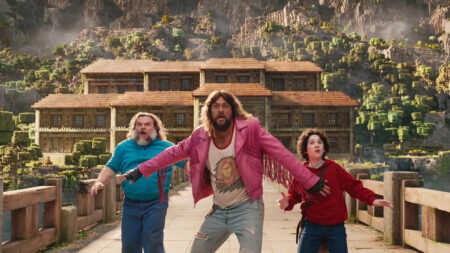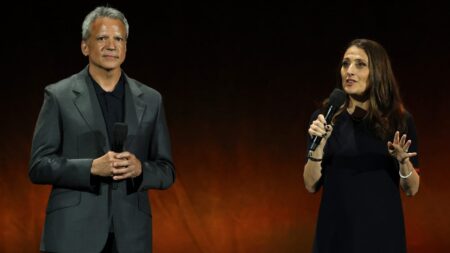Turning the mysteries of the past into wow moments on television has been Dr. Henry Louis Gates Jr.’s calling card for well over a decade. Whether it’s his award-winning PBS series Finding Your Roots or the groundbreaking African American Lives, Gates has crafted a blueprint for how history can be both entertaining and informative.
What started as a passion for storytelling has resulted in Gates becoming one of the most influential cultural historians of our time, consistently drawing a dedicated audience eager to learn more about the lineage and heritage of celebrities from all walks of life.
“I think my motto for Finding Your Roots is that we narrate world history, one ancestor at a time,” Gates tells The Hollywood Reporter. “It’s a way of telling an individual about their family tree, but it’s also a way of educating the American public about a chapter in world history of which most of them were not aware.”
With Finding Your Roots closing out its 11th season on April 8, Gates is opening the book on himself, learning his own family’s story in the engaging and deeply thoughtful way that has become the show’s trademark.
What’s been the most emotional discovery for you, personally, this season?
The disclosure of the identity of my long-lost great-great- grandfather. The roots of Finding Your Roots started when I was 9 years old and we buried my father’s father, Edward St. Lawrence Gates, at the integrated Episcopal cemetery in Cumberland, Maryland. He was so white, we called him Casper behind his back. … My father took us back to the family home that my great-great-grandmother purchased in cash for $1,400 in 1870. She was a slave until 1862. She had five children and they all looked white. She took the secret of that man’s identity to her grave [and] only told her children, including my great-grandfather, that they all had the same father and that he was a white man. … The resolution to that 150-year-old mystery will be announced to millions of people on Tuesday, April 8. That is definitely the most moving thing.
Reflecting on the hundreds of stories you’ve helped tell, what are you proudest of?
The work we have done finding Ashkenazi Jewish ancestry from Eastern Europe. When people ask, “What are the hardest genealogical fields to track?” I would say of course African Americans, because with our ancestry, the paper trail ends in the abyss of slavery. But also, Eastern European Jews. We’ve even donated funds to have records digitized. A couple of years ago, I did Mandy Patinkin and he had no idea that he had lost anyone in the Holocaust. Because for every family that moves — this is true for African Americans, too — you’ve got somebody who is crazy enough to roll the dice with $5 in their pocket and sail across the Atlantic alone. But they almost always left somebody back home.
Is there a commonality to the people you interview?
The two subliminal messages of Finding Your Roots are first, that what has made America great is that we’re a nation of immigrants. Even our Native American ancestors migrated here 15,000 years ago across the Bering Strait. Everybody here came from someplace else. The other subliminal message is that at the level of the genome, despite our apparent physical or phenotypical differences, we’re 99.99 percent the same. We need to hear those two messages urgently.
Last year, your hosting on Finding Your Roots was recognized with an Emmy nom. What did that mean for you?
To have our first nomination for Finding Your Roots be on the 10th anniversary, you can’t beat that. I’ve been teaching since I was 26, but I have two former students who are famous actors: Jodie Foster and Angela Bassett. At the Emmy ceremony we attended, Angela got her primetime Emmy. And you think, “Jesus, Angela Bassett is only now getting an Emmy?” And then at the other Emmy ceremony, Jodie, when she took the microphone, I thought, “Wow, she must have 20 of these.” She said, “I’ve been nominated four times, and this is the first one that I ever won.” So that made me realize that it truly is, as people say, just an honor.
You recently showed off some dance skills, perfectly executing Kendrick Lamar’s “Not Like Us” Super Bowl moves in a video that went viral. Care to explain?
We did that while filming Brittany Griner in Miami. It’s so emotionally exhausting — I do the father’s side of the family tree, then we break for lunch and come back and do the mother’s side. The whole thing takes five hours, sometimes longer. I have to give credit where credit is due. We have a brilliant social media producer who challenged me, “Can you do this?” I used to dance all the time, and I watched and did it. A week later, she’s telling me, “You went viral — 1.1 million on Instagram; 1.6 million on Facebook.” It was hilarious. All kinds of people have emailed me. I did not believe how many people look at that kind of stuff. I don’t even have an account.
A version of this story appeared in the April 2 issue of The Hollywood Reporter magazine. Click here to subscribe.
Read the full article here
![Tahira Kashyap's Breast Cancer relapse: Here's what you need to know [Video]](https://mediadailyfile.com/wp-content/uploads/2025/04/080420251744107852-300x169.jpeg)















